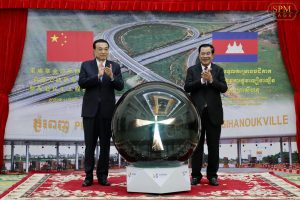China’s Premier Li Keqiang yesterday announced a large development assistance package for Cambodia, reinforcing the special relationship that has blossomed between the two countries over the past 20 years.
Li arrived on Cambodia on November 8 for a six-day visit pegged to the annual summit of the Association of Southeast Asian Nations (ASEAN), which Cambodia is chairing this year. He will represent Chinese leader Xi Jinping at the ASEAN-China Summit on November 11, the ASEAN Plus Three Summit, which also includes representatives from Japan and South Korea, on November 12, and the regional East Asia Summit on November 13.
The Chinese government also built some extra time into his schedule for a bilateral meeting with Prime Minister Hun Sen, who has developed over recent years into possibly Beijing’s closest Asian ally. After a meeting in which Li and Hun Sen exchanged praise and pleasantries on the sunny state of bilateral ties, the pro-government news outlet Fresh News reported that the two leaders oversaw the signing of 18 agreements on aid and cooperation. These spanned a broad range of issues, and included loans for infrastructure projects, export protocols, cooperation agreements, and handover certificates for completed development projects.
In addition to this, Fresh News reported that China had pledged 200 million yuan ($27.6 million) in financial assistance “to improve Cambodian citizens’ livelihood,” though the report, and comments later offered to the media from Hun Sen’s personal assistant Eang Sophalleth, offered little indication of exactly what this meant.
The Chinese premier also joined Hun Sen in presiding over the official inauguration of a 190-kilometer expressway connecting Phnom Penh with the port city of Sihanoukville on the country’s south coast, a part of China’s Belt and Road Initiative (BRI). Over the past six years, Sihanoukville has become a magnet for Chinese investment and has grown into a pulsating casino tourism hub that has recently attracted attention as a center of cyber-scam operations run by Chinese criminal syndicates.
Li pledged to continue supporting the restoration of Cambodia’s cultural heritage, increase the number of Cambodian students studying in China, and assist in demining activities. He also promised to help organize next year’s Southeast Asia Games in Phnom Penh, for which Beijing has also funded and built a 60,000-seat stadium on the outskirts of the city. In a speech during its inauguration in October of last year, Hun Sen likened the Morodok Techo Stadium to “the fruit harvested at the beginning of the season through our ironclad friendship.”
Between this week’s meetings, Li will attend the handover of a temple restored with Chinese assistance at the Angkor archaeological site, and meet with the country’s King Norodom Sihamoni. While none of these announcements were particularly eye-catching, their low-key, routine nature and broad scope points to the closeness of the patron-client relationship that has grown up between Beijing and Phnom Penh over the past two decades.
Given that a key driver of that relationship – Hun Sen’s longstanding irritation at Western pressures to introduce good governance and democratic reforms – shows no sign of going away, the Sino-Cambodian love affair is all but certain to continue.

































